‘Dangerous path’: China issues chilling AUKUS threat
China lashed out at the newly unveiled nuclear submarine deal with the UK and US, saying highly enriched, weapons-grade uranium put Australia on a “path of error and danger”.
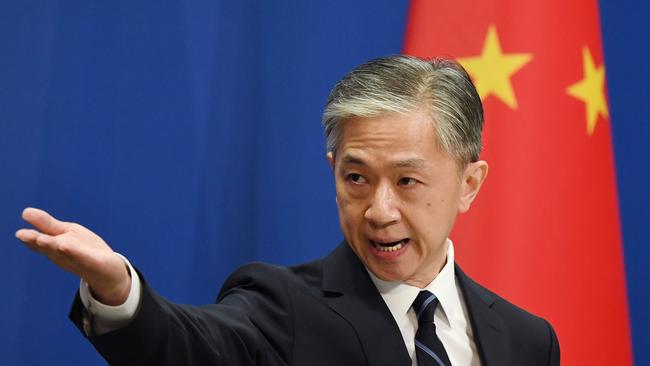
World
Don't miss out on the headlines from World. Followed categories will be added to My News.
China issued an ominous warning over the nuclear-powered submarine deal with the United Kingdom and the United States, saying the historic AUKUS pact put Australia on a “path of error and danger”.
A day after it was revealed Australia would become a major naval power in the Pacific with nuclear subs bought from the US and built with the UK, China’s Foreign Minister Wang Wenbin lashed out at what he said was the proliferation of highly enriched “weapons-grade” uranium to Australia.
“The three countries, for their own geopolitical interests, have totally disregarded the concerns of the international community and gone further down the wrong and dangerous path,” he said.
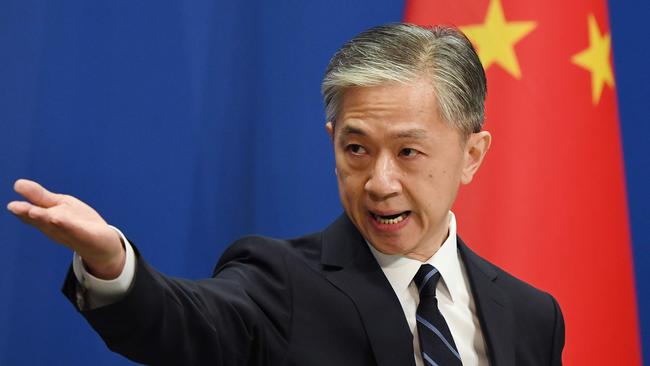
The thinly-veiled threat comes after Prime Minister Anthony Albanese joined Prime Minister Rishi Sunak and President Joe Biden to announce the purchase of up to five nuclear-powered submarines from the US and the development of a new model of attack submarine with the UK.
Asked about the AUKUS agreement, Mr Wenbin said the transfer of the US and UK’s nuclear secrets and “other cutting-edge military technologies” to Australia risked a new Cold War.
“It will only exacerbate arms race,” he said. ‘Nuclear submarine co-operation between the US, the UK and Australia involves the transfer of large amounts of weapons-grade highly enriched uranium from nuclear weapon states to a non-nuclear weapon state, which poses a serious nuclear proliferation risk and violates the purpose and object of the NPT (Nuclear Non-Proliferation Treaty).
Mr Wenbin’s comments are China’s strongest response yet to the $368bn deal. While Chinese state Twitter accounts lashed out at the “blatant act” that “hurts peace and stability in the region”, Mr Wenbin is the first state official to directly respond to the detail outlined by the leaders of the three AUKUS countries.
“It should be stressed that the Asia-Pacific is the most dynamic and fastest growing region in the world. This doesn’t come easily. China urges the three countries to heed the call of the international community and regional countries, discard the outdated Cold War zero-sum mentality and narrow geopolitical mindset, earnestly fulfil their international obligations and refrain from doing anything that undermines regional and world peace and stability,” Mr Wenbin said.
“The US, the UK and Australia should not proceed with relevant co-operation, and the IAEA Secretariat should not have consultation with the three countries on the so-called safeguards arrangements for their nuclear submarine co-operation,” he added.
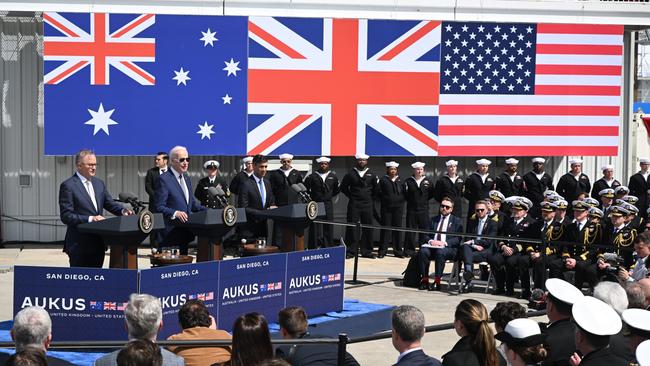
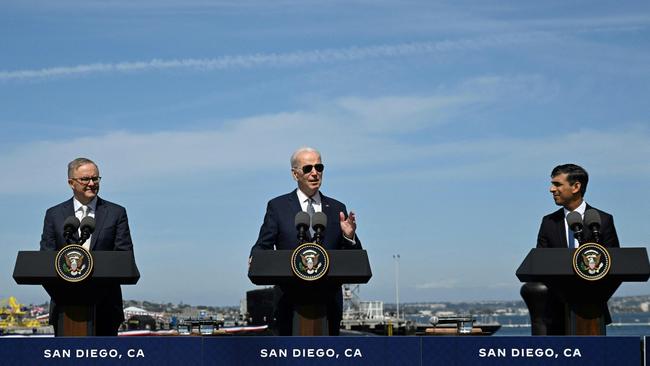
Mara Karlin, the acting deputy undersecretary of defence for policy, confirmed the State Department has had discussions with the People’s Republic of China about AUKUS but did not reveal the specifics.
“Open communication between our two countries is important for risk management,” she said at the Pentagon.
“To be very clear, AUKUS is not about any one country. It is about the need for security and stability in the Indo-Pacific.”
“This is going to take us to another level of interoperability,” she said about the US sharing its nuclear submarine technology. “The last time we did so was 1958, so it’s really a sign of how close this relationship is.
“Australia will get these subs in just about a decade. That is frankly faster than most folks expected when this was announced 18 months ago.
“These submarines are going to be especially special though because of their stealth and range.”
Australian Defence Minister Richard Marles said on Tuesday they made a massive diplomatic push to brief regional and world leaders on the AUKUS sub deal, including China.
“We offered a briefing,” Mr Marles said. “I have not participated in a briefing with China.”
Asked by if China had rejected the briefing or responded at all, Mr Marles replied: “I’m not aware of that response.”
While Mr Marles may not have yet briefed China, US National Security Adviser Jake Sullivan said the US expected a call in the coming weeks between President Biden and China’s chairman Xi Jinping.
In response, Mr Wenbin said China would maintain “necessary communication” in the wake of the AUKUS announcement once the US showed “sincerity”.
“We believe that the value and significance of communication lies in enhancing mutual understanding and managing differences,” he said.
“Communication should not be carried out for the sake of communication. The US side should show sincerity, work with China to take concrete actions to help bring China-US relations back to the right track.”
While Mr Wenbin’s comments were couched in diplomatic restraint, the state-affiliated Global Times newspaper, designated by the US State Department as a “foreign mission”, or the propaganda arm of the Chinese Communist Party, framed AUKUS as a “time bomb” that would make Australia pay an “expensive price”.
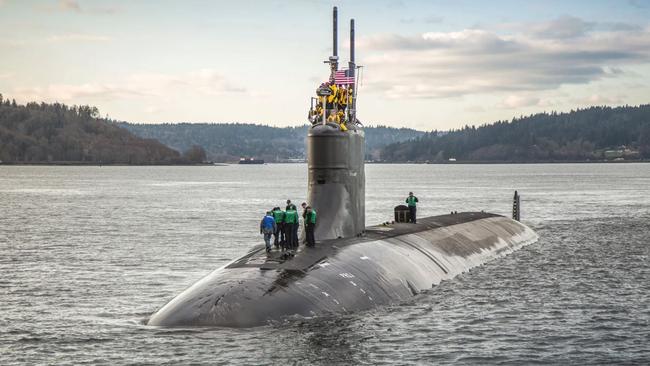
“Australia is like a guinea pig that pays money for US interests at own risks,” the Global Times said in an editorial with Beijing-based “military expert”, Wei Dongxu.
They wrote China is expected to prepare for the AUKUS nuclear submarine threat with a massive underwater build-up, including frequent hydrological and underwater geological surveys as well as the establishment of underwater sonar arrays.
“To safeguard its sovereignty, security and development interests from these threats, China should build a multidimensional anti-submarine system,” Wei said.
“This system should include more fixed-wing anti-submarine aircraft and anti-submarine helicopters in the air, destroyers and frigates with more advanced sonar devices and anti-submarine weapons, as well as China’s own fleet of conventional and nuclear-powered submarines.”
AUSTRALIA LAUNCHES ‘MISINFORMATION COUNTEROFFENSIVE’
China’s increasingly combative rhetoric comes as Australia launches a diplomatic counteroffensive to combat misinformation about the AUKUS submarine deal.
Security experts have dismissed China’s complaints, while the federal government has been focused on ensuring neighbouring countries and allies are kept informed.
Continuing this effort, Prime Minister Anthony Albanese will stop in Fiji on his way back to Australia from the US.
“I’ve been talking with other leaders in the region … explaining our position. And it’s been well-received and understood why we’re doing this,” Mr Albanese said.
Former Defence Intelligence Organisation director and Defence deputy secretary Paul Dibb said there was little doubt Australia’s acquisition of “world beater” US-made Virginia Class submarines would infuriate China.
“Why are the Chinese so angry and destructive about this acquisition? We all know its rubbish that it would involve nuclear proliferation,” he said.
“I suspect the real anger is they know very well that the American nuclear attack submarine … is infinitely quieter, infinitely harder to detect than their own very noisy nuclear attack submarines. That’s what angers them, it makes them more vulnerable.”
RUSSIA BACKS CHINA IN AUKUS ROW
Russia has accused Australia of fomenting “years of confrontation” in the Asia Pacific with the AUKUS agreement for nuclear-powered submarines.
Foreign Minister Sergei Lavrov has moved quickly to fall into lock step with China with condemnation of the alliance describing it as akin to trying to create a NATO bloc in Asia.
“The Anglo-Saxon world, with the creation of structures like AUKUS and with the advancement of NATO military infrastructures into Asia, is making a serious bet on many years of confrontation” in the region, Lavrov said in televised comments.
China’s new foreign minister Qin Gang also accused the AUKUS alliance as an attempt to gang up and form an Asia Pacific version of NATO.
The Kremlin later said AUKUS supply and later development of nuclear-powered submarines would require international oversight.
“There are a lot of questions related to issues around non-proliferation,” Kremlin spokesman Dmitry Peskov said, adding that “particular transparency will be needed”.
More Coverage
Originally published as ‘Dangerous path’: China issues chilling AUKUS threat




